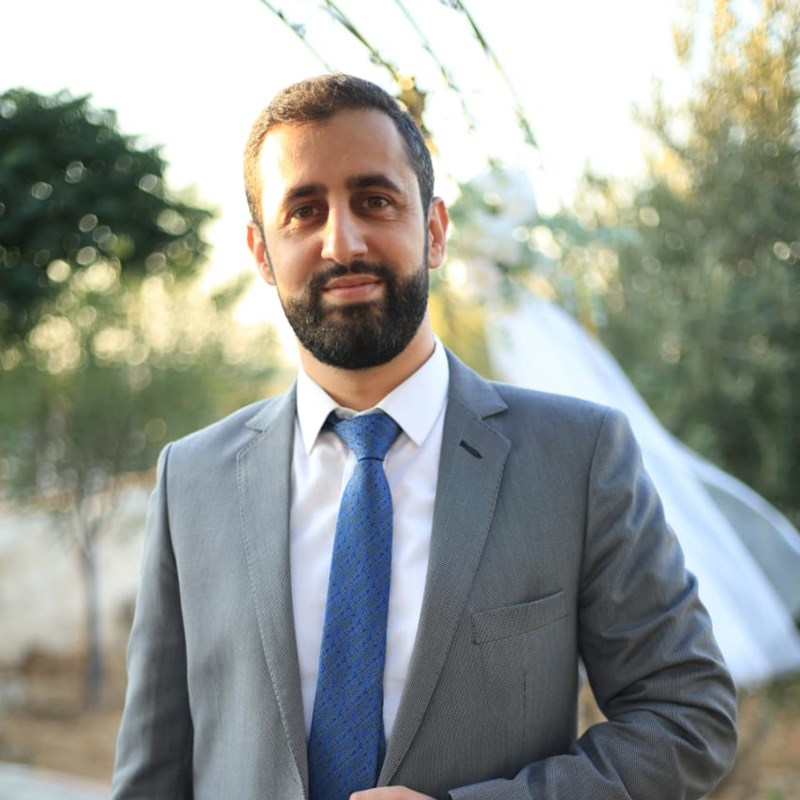Our multinational and diverse team of 31 is strategically located at HQ in Milton Keynes in the UK, where our engineers focus on Research & Development of our hardware; our regional office in Amman Jordan hosts an expert team of our software developers as well as Operations including our field-based staff; joined by Business Development and Marketing across both regions plus Washington D.C., USA.
Throughout 2021, we have caught up with some of our colleagues to hear first hand what their role involves and look behind the scenes.
R&D Director
Andy Holland
Andy, it’s been 20 years in the making, what are you most proud of?
In the late 1999 I linked up with Imad Malhas over at the first Biometric conference in London at the Cumberland Hotel, he was stuck under the table trying to get a VGA board connected to the iris-server when we met. I spent the next twenty years supporting the most pioneering projects that defined the iris industry. We created the UAE national iris border control system when no one was sure iris recognition worked. Then seeing how behind the camera technology was, we developed our own world-leading camera systems that was needed to scale for millions of users with 100% accuracy. Although Imad was skeptical at first, he put his trust in our engineering abilities and we designed the AD100 iris scanner, the most accurate iris imaging system ever built. The rest is history.
PROGRAMMING MANAGER
Rawan Malhas
Have you come across any challenges as a woman in a technical role and in a culture which is predominantly male-orientated?
If we talk about the culture then yes, there was pressure because most of my friends at university chose to go down the IT route rather than computer science and I was the only girl in the class who took this direction. I like computer science because it is logic, what you write is what you get, there are no politics… its art really.
HEAD OF ARCHITECTURE & SOLUTIONS
Mahmoud Sahmoud
What would you say are the biggest advantages we bring to our partners?
Since day one of us working in the financial/banking sector, we’ve brought in a streamlined identity across different channels. If you go to a bank, you need to provide a bank account number and signature to the teller, at the ATM you need to provide a PIN code, on the internet you need to provide your username and password. When you go to an UN agency, you need to provide an identifier. When receiving healthcare, you need to provide a card.
We offer one digital identity which can be utilized again and again in order to receive a number of different services via different platforms. From withdrawing cash at the ATM, purchasing groceries at a supermarket, to receiving assistance and getting medical care.
REGIONAL BUSINESS DEVELOPMENT MANAGER
Mustafa Jaber
The beneficiaries are using one of the most advanced technologies on the market, but its not just about the technology is it?
The most important thing is to provide the assistance to the right people. Since enabling the ATM function for example, aid agencies providing this service are able to cover much larger areas, making it more convenient for the beneficiaries. We can’t develop technology without having demand for it, we can’t develop business without the technology and so the view has to be - to view and treat beneficiaries like everyone else and get them digitally and financially included.
TECHNICAL SUPPORT MANAGER
Mohammed Al Khamaiseh
You’ve put in place the system in Iraq for pension payments, how easy was it to implement?
I worked as part of the team who did the integration with the company that provided the solution to Switch E-gate, a financial services company working with Al Rashid Bank that won a tender from the Government to settle pensions. We hosted the servers in Switch E-gate, installed the equipment in Al Rashid Bank and the integration was done with a third party based in Jordan.
You could say that it’s certainly been one of the more challenging integration projects I’ve worked on. Combination of poor and unreliable mobile coverage, Iraq being a country considered unsafe by many and movement being sometimes risky plus the fact we were working across Iraq, Lebanon and Jordan. Despite all this, we delivered a great solution regardless which processes in excess of USD $550 million per year, to over 308,000 pensioners in Iraq every month.
INFRASTRUCTURE & DEPLOYMENT MANAGER
Haitham Momani
Focusing on our deployment with LibanPost, what did the installation involve?
I stayed in Lebanon for two months and during that period we did the integration and the installation of 180 stations in 160 different location at LibanPost and Cash United. Myself and my colleague Osama Zayed supported their operators through face-to-face training sessions in different locations to get the system up and running, and we have a local technician in place with the SW/HW tools for immediate assistance if required.
Each project has a unique set of needs and parameters but we believe that it’s crucial to have a constant support on the ground post launch. We compliment this with regular visits to make sure the system is maintained effectively.
We go where we need to be and we stay until we see the solution up and running. It has to be reliable, fast and very easy to use as it enables the provision of assistance to millions who rely on it.
We are looking for exceptionally talented and passionate individuals who are eager to be part of our success
If you enjoy a challenge and would like to work in the exciting and rapidly evolving biometrics industry, take a look at our current job vacancies
Trusted by





















